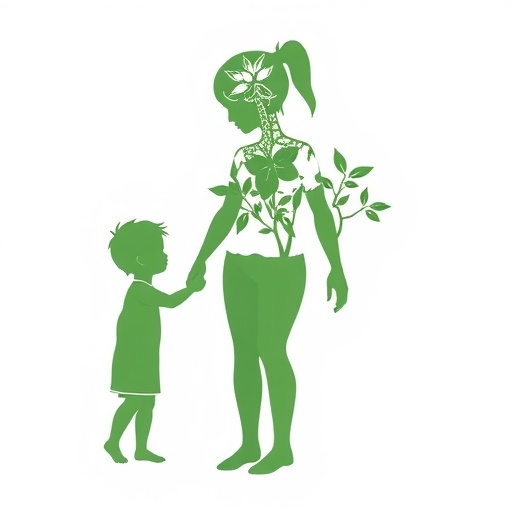Recent studies are beginning to uncover intricate connections between ecological concerns and personal life choices, particularly in the realm of reproduction. A pioneering research article, titled “The mediating role of concerns for the child and concerns for the environment in the relation between ecological preoccupations and reproductive desire,” tackles the evolving landscape of how environmental anxieties shape reproductive decisions. This thought-provoking investigation emphasizes the complex interplay of environmental, psychological, and sociocultural factors influencing individuals’ desires to have children in a rapidly changing world.
The ongoing climate crisis has become a monumental source of distress for many. This study posits that fears about the future of the planet and the well-being of children can profoundly impact reproductive decisions. As ecological concerns grow more pronounced, individuals often grapple with the implications of bringing new life into a world threatened by environmental degradation. This shift in perspective reflects a growing awareness of the responsibilities inherent in parenthood amidst pressing climate challenges.
Researchers Z. Saliez, C. Brohez, and I. Roskam, alongside their colleagues, have undertaken to quantify this relationship, revealing that parental concerns about child welfare and environmental sustainability are not just peripheral issues but can serve as mediators in reproductive desires. Their exploration leads to fascinating insights into how fears regarding ecological collapse influence not simply individual choices but broader societal changes regarding family planning and childbearing attitudes.
At the heart of the study lies the concept of “concerns for the child.” Prospective parents increasingly reflect on what it means to raise a child in a world rife with ecological turmoil. Faced with images of climate disasters, species extinction, and the unpredictable impacts of climate change, many contemplate whether bringing children into this reality is an act of hope or a source of potential harm. These genuine concerns can substantially shape one’s reproductive choices, leading to a preference for smaller families or even a deliberate decision to forgo parenthood altogether.
Meanwhile, concerns for the environment resonate powerfully within a broader cultural dialogue regarding sustainability. Increasingly aware of their individual and collective ecological footprints, individuals are questioning the sustainability of their lifestyle choices, including family expansion. The study provides evidence that a person’s ecological preoccupations can directly influence their desire to have children: individuals with heightened ecological awareness often reference environmental factors when making these significant life decisions.
The implications of this research are far-reaching. As societal norms evolve, family planning policies and reproductive rights discourse may increasingly reflect these environmental considerations. Potential parents might engage in active debates regarding the implications of their choices not only for themselves but for future generations and the planet. This could signal a fundamental shift in how family planning is approached in contemporary societies.
In an era defined by immediacy and urgency regarding environmental challenges, the findings present an opportunity for educators, policymakers, and mental health advocates to engage in meaningful discussions about reproductive rights and responsibilities. By framing parenting not only as a personal decision but one that carries ecological ramifications, stakeholders can cultivate a more nuanced understanding of the interdependencies between parenting and environmental stewardship.
The study underscores the need for interdisciplinary approaches to tackle the complexities surrounding reproductive desires and environmental concerns. Psychologists, sociologists, environmental scientists, and ethicists must collaborate to develop comprehensive strategies that address how individuals navigate their reproductive choices in light of their ecological values. Such integrative frameworks can guide future research while informing policy decisions that protect both family aspirations and the planet.
As society reckons with the implications of unsecured ecosystems and potential demographic shifts, an essential conversation is emerging: how do we balance personal aspirations with emerging global realities? The work of Saliez, Brohez, and colleagues serves as a crucial focal point for this discussion, probing deeper into the values that inform reproductive desires amid growing ecological apprehension. Their research demonstrates that understanding the motivations driving these desires can lead to more supportive societal structures for individuals grappling with these decisions.
Looking to the future, the study invites a broader examination of cultural narratives surrounding parenthood and ecological responsibility. How might narratives evolve as more people become conscious of their roles in perpetuating or alleviating environmental crises through the choices they make regarding family size? This inquiry is not merely speculative but indicative of a significant cultural shift towards a more aware and responsive approach to parenthood.
Critically, the work encourages individuals to reflect on their personal circumstances amidst global uncertainties. As personal beliefs intertwine with societal narratives, new platforms will inevitably arise for dialogue – be it in casual conversations, social media, or public forums. This rich discourse will be instrumental in shaping how the next generations perceive their roles as both consumers and caretakers of the Earth.
In summary, Saliez et al. provide an invaluable contribution to understanding the connections between environmental concern and reproductive desire. The study not only highlights pressing dilemmas facing individuals today but also showcases the importance of empathy and awareness in navigating these choices. Recognizing the powerful influence of ecological preoccupations on reproductive decisions opens pathways for future research and serves as a crucial conversation starter in an era where sustainable living is more important than ever.
As the world grapples with the implications of climate change, it is vital to address how these issues will affect future generations. This study is a clarion call to engage with the values surrounding parenthood and the environment, establishing a roadmap for responsible decision-making that honors both personal aspirations and ecological stewardship.
Subject of Research: The interplay between ecological concerns and reproductive desires.
Article Title: The mediating role of concerns for the child and concerns for the environment in the relation between ecological preoccupations and reproductive desire.
Article References:
Saliez, Z., Brohez, C., Roskam, I. et al. The mediating role of concerns for the child and concerns for the environment in the relation between ecological preoccupations and reproductive desire.
Discov Psychol 5, 109 (2025). https://doi.org/10.1007/s44202-025-00423-7
Image Credits: AI Generated
DOI:
Keywords: Climate change, reproductive decision-making, ecological concerns, parenting, psychological research.




